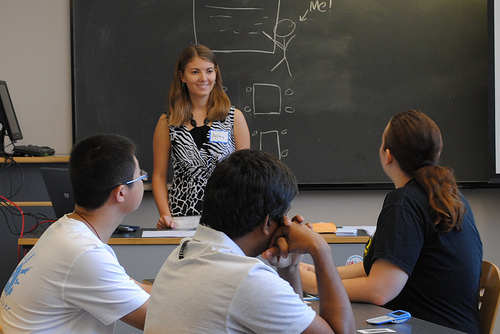

“Part of the joy inherent in a life of faith is seeing how God’s love reflected through us manifests itself in our vocations in different but wholly godly and beautiful ways.” David E. Lewis, “Integrating Faith and Vocation in a Research Career” from Faithfulness is Success: Notes to the Driven Pilgrim
Reflection
My vivid imagination has created a wonderfully precise image of a Christian graduate student who talks, teaches, writes, and researches with faith, intelligence, and success. She is articulate about her beliefs among her colleagues, brilliant in her research, and is influential in her students’ academic and spiritual lives. She weaves her identity as a follower of Christ into her research and teaching without a snag or tangle.
Even as I write, I can picture her walking from the library, a book bag on one arm, a coffee in her hand, and serenity on her face. She’s just come from a few hours of dissertating, which was challenging but rewarding, since she discovered a new connection between the Gospel message and the chapter she’s currently writing.
Sadly, she prefers the comfy confines of my imagination to the solid reality of my campus. She rarely shows up for Monday morning dissertation-writing in the library, or in my classroom, or in meetings with my dissertation advisor. Instead, it’s me who shows up, seeking to be faithful to God as I write. Seeking to honor him as I interact with my students. Seeking to glorify him as I work with my advisor. Seeking his wisdom for all of it. Seeking him.
The on-going quest to be faithful to Christ in academia, even when our conceptions of what that means differ from our daily experience, is the focus of Dr. David E. Lewis’ chapter entitled “Integrating Faith and Vocation in a Research Career”. Early in his career, Dr. Lewis sought to emulate other Christians professors whose careers were compelling reflections of God’s goodness. Although their examples were helpful, Dr. Lewis came to realize that his own strengths and interests were different than theirs and thus the blending of his faith and career as a research professor would produce a unique expression of God’s goodness and glory.
I was encouraged and somewhat relieved by Dr. Lewis’ reminder that God does not ask us to copy a model or embody an abstract ideal but to trust and seek him, even through uncertainty.
Questions
What is your vision of what a Christian scholar should be? Are there any ways you can imagine it changing?
In the moments when we don’t live up to our imagination of the perfect Christian scholar, how can we remember God’s grace to us? How can we be open to ways of being faithful we might not have anticipated?
Prayer
Lord, thank you for your love for us, however close or far we are from our own idea of who we should be. Guide us so that we seek faithfulness in all things, and ultimately so that we seek you yourself. Shape our characters so that they are formed in your image. In Christ’s Name, amen.
Further Reading
Lewis, David E. “Integrating Faith and Vocation in a research Career.” Faithful is Successful: Notes to the Driven Pilgrim. Nathan Grills, David E. Lewis, and S. Joshua Swamidass, eds. Denver, Colorado: Outskirts Press, 2014. 55-77.
Bethany Bowen-Wefuan is a PhD student in German Studies at the Carolina-Duke German Studies Program. In addition to studying 19th century German literature and teaching, she spends most of her time with friends, family, and her sweet husband Dieter.

Leave a Reply